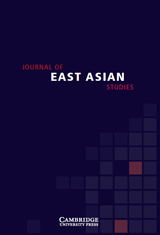
The journal is interested in work that combines theory, novel empirical contributions and engagement with the major substantive issues facing the region. The JEAS publishes primarily in the fields of international relations, including both international political economy and security studies, and comparative politics. However, we welcome interdisciplinary work and contributions from sociology, applied economics and business studies as well. The journal is also open to roundtables on important new books on the region, review essays and shorter research notes.
SSCI indexed, the journal prides itself on a strong peer-review process.For more information on submissions and subscriptions, visit the website at Cambridge University Press.
Editorial Board
| Editor | Stephan HaggardUniversity of California, San Diego |
|---|---|
| Book Review Editor | Yves TiberghienUniversity of British Columbia |
| Managing Editor | Hayeon LeeEast Asia Institute |
Journal of East Asian Studies Current Issue Vol.20 No.3

Introduction to the Journal of East Asian Studies 20, 3.
Stephan Haggard, Editor.
Many of the articles in the current issue of the JEAS explore questions of democracy in the region. We lead with a particularly well-designed study of the effect of exposure to the 1989 democracy movement in China on political attitudes by Scott Desposato and Gang Wan. They show that students in college during the movement have consistently higher support for, and understanding of, democracy than those who were in college after the movement had been quelled.
Turning to the region’s democracies—several of which are now struggling--strong contributions provide insights into politics in the Thailand, the Philippines, Taiwan and Korea.
Aim Sinpeng, Dimitar Gueorguiev and Aries A. Arugay consider how social media campaigns work, focusing on Rodrigo Duterte’s success in the Philippines. Using a variety of evidence from surveys and network analysis, they show that Duterte’s accounts were lackluster. Nonetheless, his supporters not only magnified his message online but were active offline as well.
Ryan Tans provides an example of the returns from detailed comparative case analysis on a long-standing puzzle in political economy. Tans tackles the question of the conditions under which the state can get business for higher taxes to support public goods. Using a tight design focused on two municipalities, he shows that business support waxed and waned depending on the ability of business associations to discourage tax evasion and to lobby for infrastructure that was complementary to the private sector.
In an important paper, Teri L. Caraway challenges one of the dominant models of Thai politics among institutionalists: that constitutional reform played a crucial role in Thaksin’s rise to power and—albeit indirectly—to subsequent political dynamics in the country. Caraway contends that institutions matter, but that a combination of money and social forces also mattered: Thaksin’s money was a sufficient condition for Thai Rak Thai’s 2001 victory; neither institutions nor even his platform was decisive. Once in power, Caraway focuses on how rapid implementation campaign promises created a mass constituency that in turn made Thaksin-linked parties resilient at the polls despite institutional reforms designed to weaken their electoral performance. The paper is followed by a roundtable in which three leading scholars on the country—Erik Kuhonta, Alllen Hicken and Joel Selway—debate Caraway’s claims.
Jong-sung You and Jiun-Da Lin consider another facet of democratic campaigns: the puzzle of divergent election campaign laws in Korea—where they remain highly restrictive—and Taiwan where they are more liberal. You and Lin argue that the key to these differences can be found in features of the democratic transition. In Taiwan, the opposition remained in the opposition after the transition and fought hard for liberalization. In Korea, by contrast, moments of opposition incumbency led new democratic parties to exploit restrictive laws to their advantage, but with pernicious effects over the long run.
Two pieces in this issue make contributions to the study of international politics in the region, starting with James Lee’s rich historical discussion of the origins of export-oriented industrialization in Taiwan. Drawing on archival research, he shows how the United States sought to persuade KMT leaders—with some success—that a more export-oriented strategy would advance not only economic goals but strategic ones. Shifts in policy were not so much an exercise in leverage or conditionality as the result of persuasion.
Finally, Jaganath Sankaran shows how a long-standing policy debate over ballistic missile defenses (BMD) can be addressed through simulations. China has long argued that deployed BMD assets exceed reasonable defensive requirements and could force adjustments in its own nuclear force posture. The United States points to North Korea and claims they are proportional to the threat. Using simulations, Sankaran finds support for US claims: that deployment are proportional to the threat and are unlikely to upset the US–China strategic nuclear balance.
ARTICLES
- 2021-02-05
- Aim Sinpeng, Dimitar Gueorguiev, and Aries A. Arugay
- 2021-02-05
- Scott Desposato and Gang Wang
- 2021-02-05
- Teri L. Caraway
- 2021-02-05
- Jong-sung You, Jiun-Da Lin
- 2021-02-05
- James Lee
- 2021-02-05
- Jaganath Sankaran
BOOK REVIEWS
- 2021-02-05
- Tae Yeon Eom
- 2021-02-05
- Quinn Barrie-Watts
- 2021-02-05
- Natacha Moorooven
- 2021-02-05
- Yongzheng Parker Li
- 2021-02-05
- Matthew Hamm
- 2021-02-05
- Bingjun Tang
Submission Guidelines
Manuscripts may be in the form of articles (approximately 10,000 words), review essays or commentaries (3,000 words), or book reviews (1,000 words).
Manuscripts for articles, review essays, and research notes should be submitted electronically, via the JEAS ScholarOne site.
To submit an article, please visit https://mc.manuscriptcentral.com/joeas.
Correspondence concerning book reviews should be sent to Yves Tiberghien, Journal of East Asian Studies Book Review Editor, Department of Political Science, University of British Columbia, Buchanan C 416, 1866 Main Mall, Vancouver, British Columbia V6T 1Z1, Canada.Phone: 604-822-4358; fax: 604-822-5540; email: yvestibe@politics.ubc.ca.
Subscribe
| Year | Category | Access Type | Price |
|---|---|---|---|
| 2020 | Institutions | Online only | $216 |
| 2020 | Institutions | Online & Print | $240 |
| 2020 | Individual | Online only | $70 |
| 2020 | Individual | Online & Print | $78 |